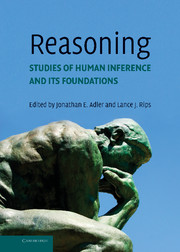Book contents
- Frontmatter
- Contents
- Preface
- List of Contributors
- Introduction: Philosophical Foundations
- PART I FOUNDATIONS OF REASONING
- PART II MODES OF REASONING
- PART II INTERACTIONS OF REASONING IN HUMAN THOUGHT
- Section 9 Reasoning and Pragmatics
- Section 10 Domain-Specific, Goal-Based, and Evolutionary Approaches
- 39 Domain-Specific Knowledge and Conceptual Change
- 40 Pragmatic Reasoning Schemas
- 41 Beyond Intuition and Instinct Blindness: Toward an Evolutionarily Rigorous Cognitive Science
- 42 Use or Misuse of the Selection Task? Rejoinder to Fiddick, Cosmides, and Tooby
- 43 Why We Are So Good at Catching Cheaters
- 44 The Modularity of Mind: An Essay on Faculty Psychology
- 45 Commitment
- 46 Evolution of Inference
- Section 11 Reasoning and Cultures
- Section 12 Biology, Emotions, and Reasoning
- Index
- References
40 - Pragmatic Reasoning Schemas
Published online by Cambridge University Press: 05 June 2012
- Frontmatter
- Contents
- Preface
- List of Contributors
- Introduction: Philosophical Foundations
- PART I FOUNDATIONS OF REASONING
- PART II MODES OF REASONING
- PART II INTERACTIONS OF REASONING IN HUMAN THOUGHT
- Section 9 Reasoning and Pragmatics
- Section 10 Domain-Specific, Goal-Based, and Evolutionary Approaches
- 39 Domain-Specific Knowledge and Conceptual Change
- 40 Pragmatic Reasoning Schemas
- 41 Beyond Intuition and Instinct Blindness: Toward an Evolutionarily Rigorous Cognitive Science
- 42 Use or Misuse of the Selection Task? Rejoinder to Fiddick, Cosmides, and Tooby
- 43 Why We Are So Good at Catching Cheaters
- 44 The Modularity of Mind: An Essay on Faculty Psychology
- 45 Commitment
- 46 Evolution of Inference
- Section 11 Reasoning and Cultures
- Section 12 Biology, Emotions, and Reasoning
- Index
- References
Summary
Reasoning fallacies are apparent in discourse and behavior. Their causes, however, have been as mysterious and elusive as the fallacies themselves are evident. A classic debate among both philosophers and psychologists concerns whether apparent fallacies directly reflect errors in the deductive process or indirectly reflect changes in the interpretation of the material from which one reasons. According to the latter view, “fallacies” in fact stem from interpretational changes such as the addition or omission of premises. It has been claimed that if such changes are taken into account, adults in fact reason in accord with formal logic (Henle, 1962). The above view assumes two components in the reasoning process: a deductive component that has context-free, syntactic rules comparable to those in formal logic and an interpretative component that maps statements in natural language onto syntactic rules in the deductive component.
Despite abundant evidence for such interpretational changes (e.g., Fillenbaum, 1975, 1976; Geis & Zwicky, 1971), they in fact cannot fully account for typical patterns of errors produced by college students in deductive reasoning tasks (see Evans, 1982, for a review). Some of these patterns are inconsistent with any logical interpretation of the materials. One such line of evidence is based on Wason's (1966) selection task. In this task, subjects are informed that they will be shown cards that have numbers on one side and letters on the other, and are given a rule such as, “If a card has a vowel on one side, then it has an even number on the other.”
- Type
- Chapter
- Information
- ReasoningStudies of Human Inference and its Foundations, pp. 827 - 842Publisher: Cambridge University PressPrint publication year: 2008
References
- 2
- Cited by



